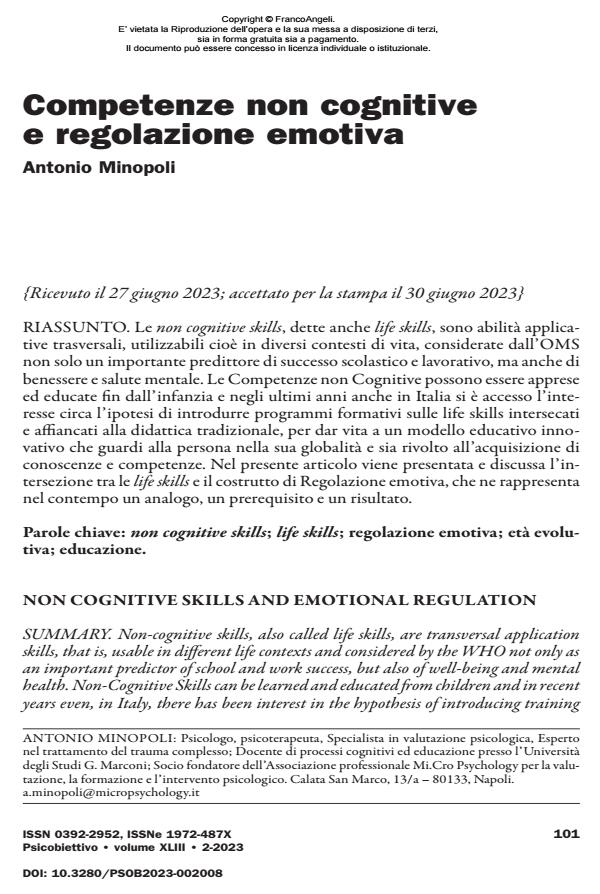Competenze non cognitive e regolazione emotiva
Titolo Rivista PSICOBIETTIVO
Autori/Curatori Antonio Minopoli
Anno di pubblicazione 2023 Fascicolo 2023/2
Lingua Italiano Numero pagine 22 P. 101-122 Dimensione file 714 KB
DOI 10.3280/PSOB2023-002008
Il DOI è il codice a barre della proprietà intellettuale: per saperne di più
clicca qui
Qui sotto puoi vedere in anteprima la prima pagina di questo articolo.
Se questo articolo ti interessa, lo puoi acquistare (e scaricare in formato pdf) seguendo le facili indicazioni per acquistare il download credit. Acquista Download Credits per scaricare questo Articolo in formato PDF

FrancoAngeli è membro della Publishers International Linking Association, Inc (PILA), associazione indipendente e non profit per facilitare (attraverso i servizi tecnologici implementati da CrossRef.org) l’accesso degli studiosi ai contenuti digitali nelle pubblicazioni professionali e scientifiche.
Le non cognitive skills, dette anche life skills, sono abilità applicative trasversali, utilizzabili cioè in diversi contesti di vita, considerate dall’OMS non solo un importante predittore di successo scolastico e lavorativo, ma anche di benessere e salute mentale. Le Competenze non Cognitive possono essere apprese ed educate fin dall’infanzia e negli ultimi anni anche in Italia si è accesso l’interesse circa l’ipotesi di introdurre programmi formativi sulle life skills intersecati e affiancati alla didattica tradizionale, per dar vita a un modello educativo inno- vativo che guardi alla persona nella sua globalità e sia rivolto all’acquisizione di conoscenze e competenze. Nel presente articolo viene presentata e discussa l’intersezione tra le life skills e il costrutto di Regolazione emotiva, che ne rappresenta nel contempo un analogo, un prerequisito e un risultato.
Parole chiave:non cognitive skills; life skills; regolazione emotiva; età evolu tiva; educazione.
Antonio Minopoli, Competenze non cognitive e regolazione emotiva in "PSICOBIETTIVO" 2/2023, pp 101-122, DOI: 10.3280/PSOB2023-002008